Brian Michael Slator
Computer Science and
Operations Research
North Dakota State University
IACC Building, Rm. #258-A6
Fargo, ND 58105
phone: (701) 231-6124
e-mail:
slator@badlands.nodak.edu
ILS RESEARCH PROJECT WORK
The Institute for the Learning Sciences (ILS), is a university research facility with substantial corporate connections and affiliations. The Institute conducts research and development projects in the areas of multi-media and educational technology, intelligent turoring, and performace support. ILS projects are typically charactarized by mechanisms for case-based reasoning and retrieval, support for knowledge-based browsing, a concern with capturing human and corporate memory, and easy to use human-computer interface. The educational systems focus on user control, goal-based scenarios, learning by doing, and failure-based remediation.
As a member of the research faculty at Northwestern University,
I have designed, managed and/or played a leading role in the implementation of the following research and development projects.
ORCA
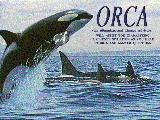 ORCA - (the ORganizational Change Advisor) is a job aid and creativity tool to assist consultants whose task is process redesign and managing organizational change. Using ORCA, the consultant systematically and iteratively analyzes the situation of a client in order to recognize potential business or organizational problems. The system assists the consultant in thinking and problem solving by retrieving historical cases that are judged relevant to understanding the client's situation. The retrieval and examination of past cases provides general perspective and contextual advice which helps the consultant plan for change and avoid past failures.
ORCA - (the ORganizational Change Advisor) is a job aid and creativity tool to assist consultants whose task is process redesign and managing organizational change. Using ORCA, the consultant systematically and iteratively analyzes the situation of a client in order to recognize potential business or organizational problems. The system assists the consultant in thinking and problem solving by retrieving historical cases that are judged relevant to understanding the client's situation. The retrieval and examination of past cases provides general perspective and contextual advice which helps the consultant plan for change and avoid past failures.
Related publications:
- Slator, Brian M. and E. Ray Bareiss (1992). Incremental Reminding: the case-based elaboration and interpretation of complex problem situations. Proceedings of the 14th Annual Conference of the Cognitive Science Society. Bloomington, IN, pp. 1122-1127. (119 KByte Postscript file)
- Bareiss, E. Ray, and Brian M. Slator (1993). The Evolution of a Case-based Approach to Knowledge Representation, Categorization, and Learning, In Categorization by Humans and Machines. (The Psychology of Learning and Motivation, Vol. 29, Chapter 6, pp. 157-186, edited by Nakamura, Taraban, and Medin). San Diego: Academic Press. (116 KByte Postscript file).
SELL!
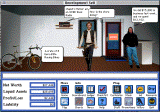 SELL! is a multi-playered, networked game that teaches basic marketing and micro-economic concepts. Players are immersed in a simulated environment where they are expected to save a failing retail outlet. The tools of the retail trade, (hiring, advertising, ordering, pricing), are made available, and the underlying simulation is crafted to respond to game play in plausible ways. Throughout the course of a game, players have the opportunity to consult real world entrepreneurs, advertising executives and economists for guidance as they attempt to build up the net worth and market presence of their simulated businesses.
SELL! is a multi-playered, networked game that teaches basic marketing and micro-economic concepts. Players are immersed in a simulated environment where they are expected to save a failing retail outlet. The tools of the retail trade, (hiring, advertising, ordering, pricing), are made available, and the underlying simulation is crafted to respond to game play in plausible ways. Throughout the course of a game, players have the opportunity to consult real world entrepreneurs, advertising executives and economists for guidance as they attempt to build up the net worth and market presence of their simulated businesses.
Related publications:
- Slator, Brian M. and Harold "Cliff" Chaput. Learning
by Learning Roles: a virtual role-playing environment for
tutoring (1996) Proceedings of the Third International Conference
on Intelligent Tutoring Systems (ITS'96). Montreal:
Springer-Verlag, June 12-14, pp. 668-676. (Lecture
Notes in Computer Science, edited by C. Frasson, G. Gauthier, A. Lesgold)
(400 KByte Postscript file).
- Hooker, Robert and Brian M. Slator (1996).
A Model of Consumer
Decision Making for a Mud Based Game. Proceedings of the
Simulation-Based Learning Technology Workshop at the Third
International Conference on Intelligent Tutoring Systems
(ITS'96). Montreal, June 11, pp. 49-58. (545 KByte Postscript file).
RISK/AUDIT COACH
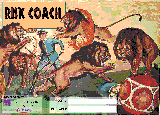 The Risk/Audit Coach is a performance support system designed to assist internal auditors in planning and executing their audit engagements. By modeling the auditor's task, and further modeling the processes being audited, the Coach is able to provide structured task-oriented support and context-sensitive help and advice at every stage of the auditing process. In addition, by tracking an auditor's progress and the categorization of their audit, the Risk/Audit Coach is able to retrieve relevant similar audit reports and audit stories from its case library.
The Risk/Audit Coach is a performance support system designed to assist internal auditors in planning and executing their audit engagements. By modeling the auditor's task, and further modeling the processes being audited, the Coach is able to provide structured task-oriented support and context-sensitive help and advice at every stage of the auditing process. In addition, by tracking an auditor's progress and the categorization of their audit, the Risk/Audit Coach is able to retrieve relevant similar audit reports and audit stories from its case library.
SMART SHOPPER
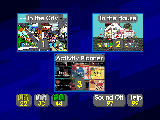 Smart Shopper is a
Smart Shopper is a "Yellow Pages of the future" that allows consumers to locate products, and services according to natural ways of searching and browsing, rather than the traditional alphabetical organization of conventional phone books. By employing hypertext technology, and organizing headings according to a generalized scheme of coherent, natural activities, Smart Shopper reconstructs the Yellow Pages into a knowledge base for search and retrieval. This organizational scheme also provides additional benefits such as activity and trip planning.
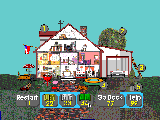 The software technology included in
The software technology included in "Smart Shopper" lets the user navigate and browse through the information in a natural and intuitive way. Seeking specific or general products and services, the customer interacts with a very user-friendly interface by selecting paths or routes (presented in both graphic and text forms) that lead to the areas relevant to the customer's goals. Because the knowledgebase is constructed to place similar and complementary products in adjacent space, the customer can find what they need and view information on related or complementary products/services as well.
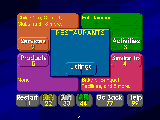 From the business perspective, advertising is strategically placed throughout the hypertext pathways and can be updated as often as advertisers change their promotions. The ability of the system to capture demographic and behavioral profiles may also provide the foundation for initiatives in marketing.
From the business perspective, advertising is strategically placed throughout the hypertext pathways and can be updated as often as advertisers change their promotions. The ability of the system to capture demographic and behavioral profiles may also provide the foundation for initiatives in marketing.
In addition, the Smart Shopper project spawned the development of the Cool Tool: an intelligent support environment for creating large, coherent, interconnected, semantic knowledge networks. The Cool Tool operates over the products and services of the Yellow Pages, which is a large and unstructured set of concepts and relations. The tool is armed with a small set of heuristic rules of inference and a weighting scheme. Once all the headings have been classified (a straightforward process), the tool is able to suggest headings that should be related to each other, and the relationship they should have -- and these suggestions are automatically prioritized. This means the enormous task of creating a richly connected semantic network of Yellow Pages headings is suddenly made tractable.
FOODSTATION
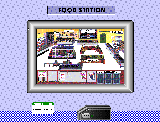 The FoodStation project is designed to allow the user to explore a wide variety of options in food preparation and consumption, including recipes and recipe guides, on-line shopping capabilities and recommendations for different classifications of eaters (e.g. low-fat, low cholesterol, etc.). FoodStation focuses on the future of grocery store management and the chains of distribution affected by it.
The FoodStation project is designed to allow the user to explore a wide variety of options in food preparation and consumption, including recipes and recipe guides, on-line shopping capabilities and recommendations for different classifications of eaters (e.g. low-fat, low cholesterol, etc.). FoodStation focuses on the future of grocery store management and the chains of distribution affected by it.
Related publication:
TAXOPS
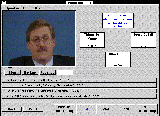 Intended primarily as a job aid, this tax opportunity advisor helps tax professionals to uncover possible consulting opportunities. In response to client information which the user enters into the system, one of hundreds of video clips may be shown of company partners describing (through
Intended primarily as a job aid, this tax opportunity advisor helps tax professionals to uncover possible consulting opportunities. In response to client information which the user enters into the system, one of hundreds of video clips may be shown of company partners describing (through "war stories") different service lines. Taxops also functions as a role model for how to do process thinking: thinking through the ramifications of how various client activities interact with the full spectrum of tax issues.
Related publications:
- Slator, Brian M. and Christopher K. Riesbeck (1992). TaxOps: a Case-based Advisor International Journal of Expert Systems, Vol. 4, No. 2, pp. 117-140 (Special issue on Case-based Reasoning, edited by Evangelous Simoudis), JAI Press: Greenwich, CT. (867 KByte Postscript file).
- Slator, Brian M. and Kerim C. Fidel (1994). Topical Indexing and Questions to Represent Text for Retrieval and Browsing. Integrated Computer-Aided Engineering , Vol. 6, No. 4, pp. 495-510. (Special Issue on Knowledge Extraction from Text, edited by Steven Leo Lytinen). Wiley and Sons: New York. (1.3 GByte Postscript file).
TOTAL QUALITY MANAGEMENT
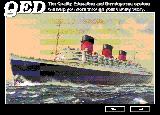 The QED project focused on the development of a story-based learning system to provide TQM teams with the tools to develop critical thinking and innovative problem solving skills. This application presents stories illustrating lessons learned from the successes and failures of Total Quality Management teams, as well as supporting the problem-solving principles included in the Total Quality Management program.
The QED project focused on the development of a story-based learning system to provide TQM teams with the tools to develop critical thinking and innovative problem solving skills. This application presents stories illustrating lessons learned from the successes and failures of Total Quality Management teams, as well as supporting the problem-solving principles included in the Total Quality Management program.
Related publication:
- Slator, Brian M., Harold "Cliff" Chaput, Kerim C. Fidel, Ken Greenlee, Debra Jenkins, Scott MacQuarrie, Colette Marine, Leena Nanda, Lee Pavlock, and Diane Schwartz (1994). Problem Solving and Case-based Reasoning. Annual Review of Communications. National Engineering Consortium: Chicago, IL. pp. 435-444. (75 KByte Postscript file).
Summary
These systems combine elements from the following three research and development areas:
1. PRACTICE ENVIRONMENTS
ILS has built various environments that model individual behavior as well as group behavior. A user interacts with the simulation as a means of practicing in a simulated, risk free environment. These environments teach selling skills, management skills, and individual planning skills.
2. TRAINING ENVIRONMENTS
The Institute builds systems for customer service training environments that can be delivered as courses or as just-in-time training. These training systems use storytelling, failure driven learning, and learn-by-doing strategies to teach reasoning within a service domain.
3. ASK SYSTEMS
ASK systems allow for the construction of video-based corporate memories or repositories of expertise that contain thousands of answers to various questions and allow for easy navigation to those answers. They are useful internally in companies and externally for getting the message to the general public.
Original file name:project.work.rtfThis file was conve
rted with TextToHTML - (c) Logic n.v.
Last Updated: Tuesday, January 9, 1996